Chat is the core of any activity in Microsoft Teams. From individual and group chats, to chats in channels, meetings, and apps – there’s a myriad of ways you can chat in Teams. In this article we’ll cover everything you need to know about chat.
- Types of chat
- Chat with external users in Microsoft Teams
- Format a message
- Posts in multiple channels
- Bring emotions to your conversations
- Share files in a chat
- Microsoft Teams chat and apps
- Search for a message
- Hide, mute and pin chat in Microsoft Teams
- Choose how much chat history to show
- Conversation with a bot
Types of chat
One-on-one chat
Every now and then, you may want to communicate with a specific person one-on-one. To start a private conversation, select New chat at the top of your chat list and start entering the name of the person you want to chat with.

Then, type your message and click Send. Your chat has started.

Group chat
Similarly, you can have a group chat. Instead of selecting only one person, type the names of the users you want to include in the chat. Then, select the down arrow ˅ on the far right of the To field and give a name to your chat.
Whether it´s a one-on-one or a group chat, after starting your conversation, you can always go back to it by selecting it in the chat list.

Chat in a Microsoft Teams channel
To keep your team up to date about important news and announcements and other activities, you can start conversations in channels in Posts tab. Everyone who has access to the channel will be able to see the message. You and your team members can reply to the conversations. These replies will appear as a thread and will be attached to the original post.
To make sure the right users see the post, you can tag them with @mention. You can mention individuals, groups of people and the whole channel, depending on the audience you’re targeting.

The types of posts you make in each channel will depend on your company working culture and the topics that you’re supposed to cover in the channel.
Chat in a moderated channel
You can configure channel conversation in channel settings. If channel moderation is on, you can define team member permissions. For example, you can restrict team members from replying to channel messages.
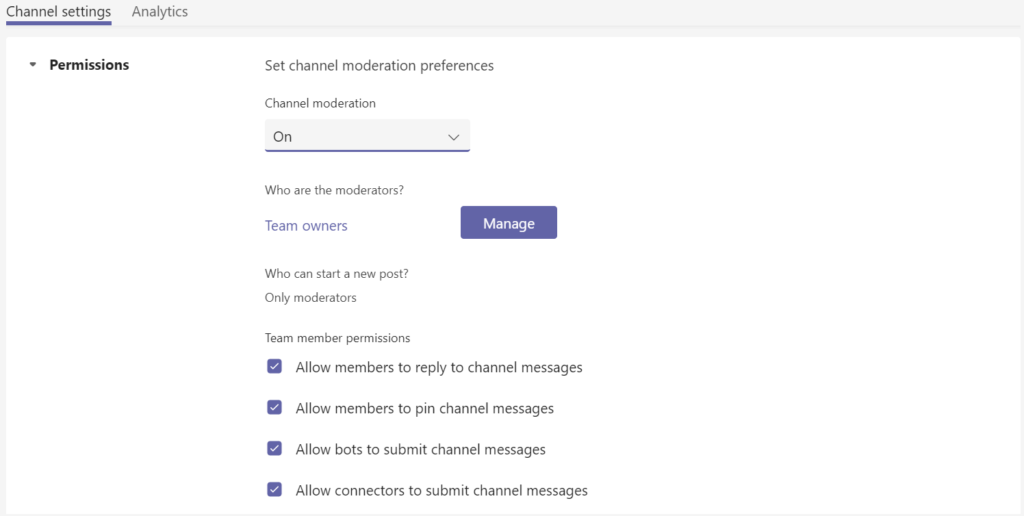
This can come in handy if you work in a large organization and want to have a channel dedicated solely to announcements. You will use the channel to share important information with users and at the same time make sure it doesn’t provoke heated discussions.
Chat in a Microsoft Teams meeting
Whenever you schedule a meeting in Microsoft Teams, you can see a chat on the top of your chat list with the title of the meeting and a calendar icon. These chats are there to so that you could add meeting notes, sum up important points of the meetings, see meetings recordings and transcripts, share links and other information.

Chat with external users in Microsoft Teams
In Microsoft Team, you can chat not only with your team members and people from your organization. You can also send messages to external users if they have Teams account and have external access permissions.
Click on New chat (Ctrl+N) and type their email address.
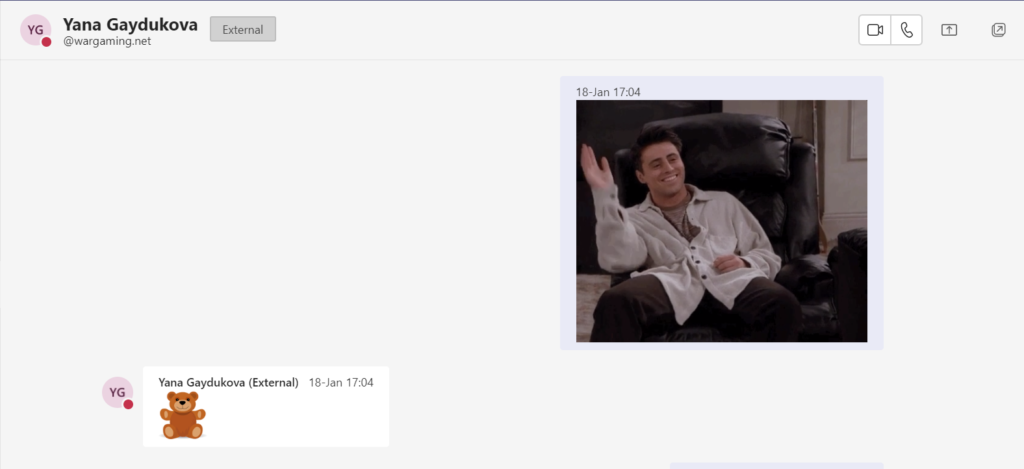
You can start the chat by composing a message.
If yours and the other user’s governance policies allow so, you can also make calls and start video meetings through chat.

The Catalog of Microsoft Teams use cases
Explore the most common Microsoft Teams scenarios and use cases
Format a message
There are lots of ways you can format a message in your chat. To open formatting options, click on New conversation -> Format.
Formatting messages is best for easier tracking of conversations and for giving your team members the context of your message before delving into details.
You can add a headline – subject of your message; highlight, bold, italicize and underline your text; change the font size and color, and other. Check out all the fun formatting options.

Posts in multiple channels
If your message covers several subjects and you would like to share it in multiple channels, you can do so by opening formatting options.

Select Post in multiple channels and in the To field click on Select channels. Then, choose the necessary channels.
Bring emotions to your conversations
Depending on your working environment, work culture and the topic of conversation, you may want to bring some emotions to your message.
You can do that in chat in Microsoft Teams by adding emojis, gifs and stickers. The cool thing about stickers is that you can customize by adding captions of your own choice.
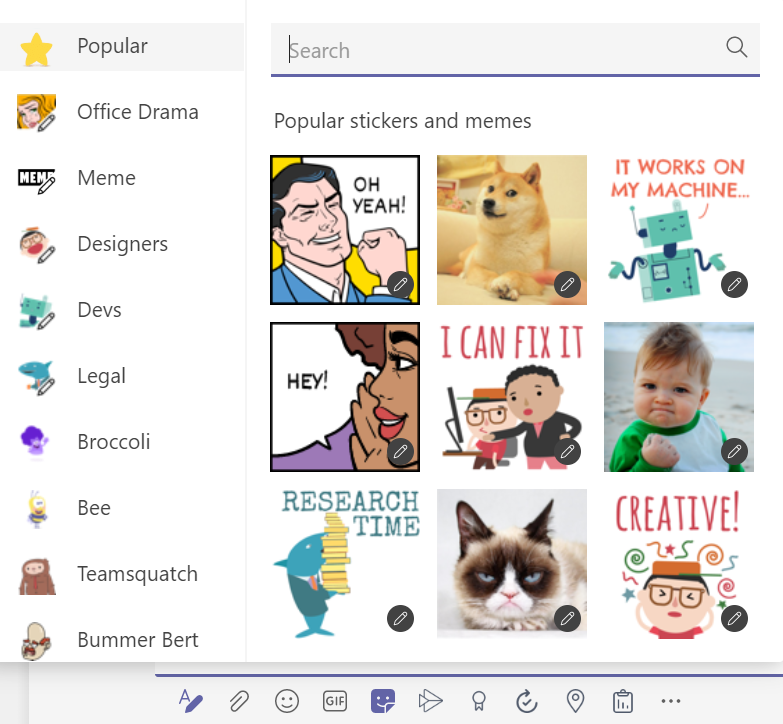
Share files in a chat
Additionally, you can share files in a chat – whether it’s a one-on-one, group or a channel conversation. Click on Attach and choose among recent files, channel documents or OneDrive storage. You can also upload a file from your computer or simply drop them in the conversation box.

All the files that you upload from your computer will be automatically saved in the Files tab of the channel where you share your post or in OneDrive if it’s a private chat.
Microsoft Teams chat and apps
You can integrate a Microsoft or 3rd party app into your message to start a conversation with a context.
On the tool bar under the text box, you can see a couple of buttons that you probably never clicked on before. Let’s see what they do.
Stream
If you actively use Microsoft Stream and wish to share some videos with your teammates, this feature is for you! It opens your Stream library and allows you to attach videos to your message.

Praise
You can recognize your team members’ achievements by sending them praise. Select a badge that suits them best and make them feel appreciated for their hard work.
Approvals
Create an approval request without bugging your manager in private messages. Type the name of the request, select the approver, and add an attachment. You can also leave some details if needed.
Places
Let your team know where you are by sharing your location or, perhaps, a place where you’re planning to have your next team building activity.
If you’d like to include other apps in your chat, in the toolbar under your conversation box click on […] More options and select an app that you want – for example, Poll.


Search for a message
If you need to find a message in a chat, there’s a couple of ways you can do that
Command box
Type a word or a phrase that you remember from the message you’re looking for in the Command box. You will then see a list of all the messages that contain this keyword.
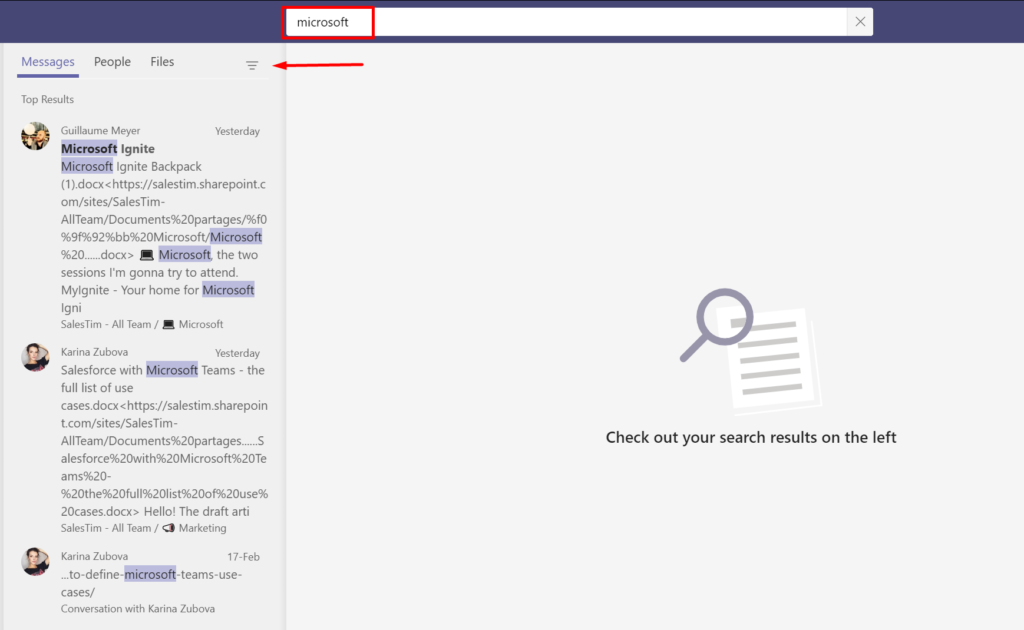
Filter
If there are too many messages with this keyword, but you remember certain attributes of the required message, you can use filter to find it. Thus, you can add a subject, data range, the team where you saw this message, the channel and who it was sent by.

Saved messages
To save a message click on […] More options next to it and select Save this message.
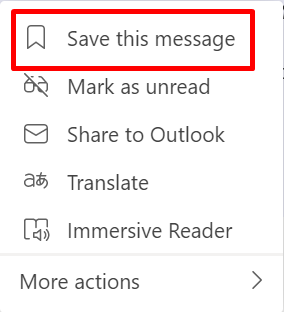
You can find all your saved messages, select your profile picture at the top of the app and click on Saved.
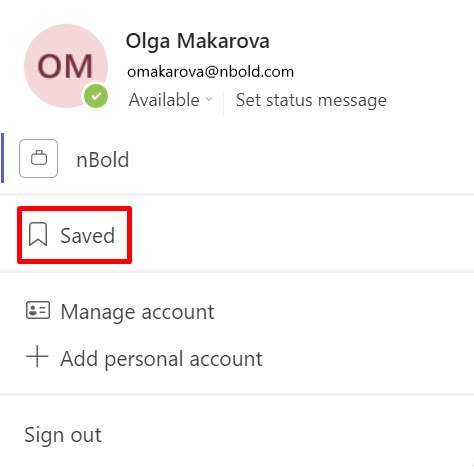
Hide, mute and pin chat in Microsoft Teams
You can’t delete an entire conversation from your chat box in Microsoft Teams. However, you can hide it if it’s not relevant for you anymore or mute if you wish to start receiving notifications. At the same time, if a certain chat is very important and you want it always to stay visible, you can pin it and it will appear at the top of your chat list.
To do so, open your chat list and click on More options […] next to the right chat. Then, select mute, hide, or pin, depending on the desired action.

If you hide a chat, it will stay hidden until someone posts a new message there.
To unhide a chat, in the Search box type a word or a phrase that appeared in the chat, choose the hidden chat, click on More options […] and then Unhide.

Choose how much chat history to show
If you want to add a new participant to a group chat in Microsoft Teams, you can decide how much chat history will be shown to them.
To view all choices, select View and add participants in the top right corner of Teams and click on Add people.
Type the names of the people you’d like to add to the group chat and select how much of the chat history to include.
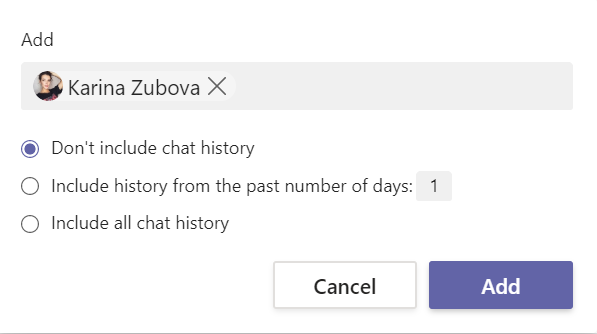
Conversation with a bot
Finally, you can chat with a bot in Microsoft Teams. Bots allow to search for and share information from different apps through texts, interactive cards and tasks.
Conversation bots can be designed to handle very simple commands, or complex AI-powered virtual assistants.

To find and install bots go Apps in your Teams environment, select Bots and choose the bot you’re looking for.
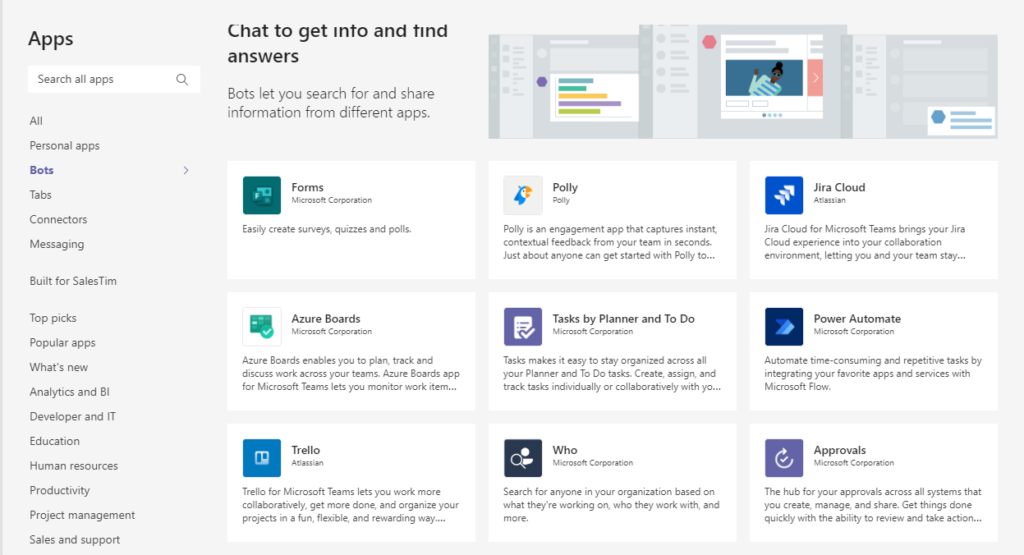
You can also build a bot for Teams through Microsoft Bot Framework. You can find more details here.
There you have it, all there is to know about chat in Microsoft Teams (so far!).
For more tips on how to get the most out of Microsoft Teams, here are a few blog posts that might interest you:
